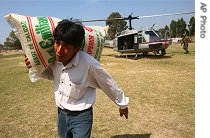2007年VOA标准英语-UN: Difficulty of Aid Distribution in Peru Easi(在线收听)
Geneva
21 August 2007
United Nations aid agencies say the distribution of humanitarian assistance to victims of Peru's devastating earthquake remains problematic. But they say the situation is beginning to ease. Lisa Schlein reports for VOA from Geneva.
 |
| A man unloads a bag of rice from helicopter delivering relief aid in village of Palto, Peru, 20 Aug 2007 |
Aid agencies say people have to be on guard against falling debris. They also say many people are suffering from bronchitis and other respiratory conditions because of the dust that was churned up by the disaster.
A spokeswoman for the World Food Program, Christiane Berthiaume, says it is difficult to get aid to the survivors because roads are bad, traffic is heavy and a major bridge leading to the quake-hit city of Pisco is damaged.
Nevertheless, she says more food and other aid is getting in and being distributed.
"My colleague who is in Pisco told me that planes are landing in the airport, planes coming from all surrounding countries," Berthiaume said. "But ... it is difficult, because people are staying in the rubbles of their houses, you know close. And, so they are everywhere. It is difficult to reach them. It is not impossible, but it is difficult."
Berthiaume says it would be easier to deliver aid if victims moved to centralized shelters, which act as distribution points. But, she says survivors want to say close to their homes because they are afraid looters will steal their possessions.
A U.N. humanitarian official, Elizabeth Byrs, says the U.N. has set up a coordination center at Pisco airport to avoid bottlenecks and oversee the distribution of relief supplies.
She says there are no reports now of serious security problems and traveling in the area is safe.
"We were concerned by the security situation and now that the distribution has started, I think people are getting what they need," Byrs said. "But, still it is a long process because of the damage of infrastructure and because of logistic problems. We expect to solve them and support the authorities."
Official reports put the number of dead at over 500, with more than 1,000 injured. Preliminary assessments say more than 34,000 houses have been destroyed.
Peruvian authorities say critical needs include water, water purification pills, tents, electric generators, blankets and tools to remove rubble.